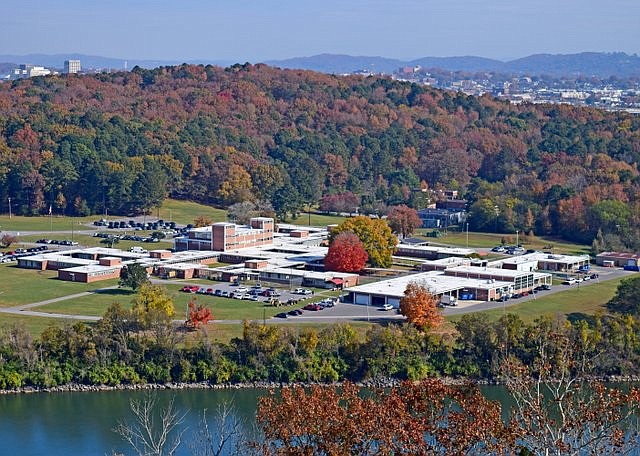Targeted for closure in a master plan by Gov. Ned McWherter's administration in the early 1990s, said to be on the chopping block by the Sundquist administration in 1999, downsized by forced budget cuts during the Bredesen administration in 2009 and marked as potentially being shut down in 10 years by Gov. Bill Haslam 10 years ago this week, the Moccasin Bend Mental Health Institute could get a shot in the arm with plans for a $276.52 million renovation by the Lee administration.
But with the Moccasin Bend National Archeological District having sprung up around it in the past 15 years, and with documented cultural assets such as a Woodland mound complex on hospital grounds, is that the right move?
And if money for such a rebuild is available from pandemic-related American Rescue Plan (ARP) funds, why not construct the hospital elsewhere and give the land to the park that is assumed one day will have it anyway?
State Rep. Patsy Hazlewood, R-Signal Mountain, chairman of the House Finance Committee and a member of the Financial Stimulus Accountability Group, said nothing is set in stone and there is still "exploration going on."
If there is "a better alternative as [cost-efficient] and still able to house services" - that would be "a safer, better place" - she is open to that.
The Financial Stimulus Accountability Group will discuss the matter further in December, Hazlewood said.
Tricia Mims, executive director of National Park Partners, said her organization "hopes all opportunities are being explored." If the hospital is renovated or rebuilt on the site, it could be two more generations before all of the area's "incredible resources" are seen.
"It would be a missed opportunity for the park to be able to open up," she said.
However, Mims said her organization has a good partnership with the hospital, that the organization realizes the facility is getting outdated and that the ARP funds are a once-in-a-generation opportunity for a hospital that plays an important role in the community.
Brad Bennett, superintendent of the Chickamauga and Chattanooga National Military Park, of which the archeological district is a part, said the 2003 federal legislation that created the district authorizes the National Park Service (NPS) to acquire through donation any adjacent state, county or and city owned property on Moccasin Bend when and if the parcels are no longer used for their current purposes.
A Cultural Landscape Report prepared for the district in 2014 suggested that for the site to fully realize its dream, the park service must acquire the hospital and other parcels nearby. A 2017 NPS General Management Plan Amendment reiterated the importance of acquiring additional acreage when available.
While the Lee administration and its stimulus group ponder their next move, it is ironic to remember it was the hospital's board of directors - according to newspaper archives - which, in 1994, called for public meetings on the possibility of adding Moccasin Bend land to the national parks system.
Later, then-U.S. Rep. Zach Wamp championed the cause, and in 2003 the district was created as part of the Chickamauaga and Chattanooga National Military Park.
As part of that start-up, the institute's 15-member board of trustees unanimously passed a resolution to donate 246 acres of state land surrounding the hospital to the NPS.
During the next decade and a half, as plans for the park developed, the hospital fell on hard times.
In 2009, during the Great Recession, Gov. Phil Bredesen slashed $11.8 million from Moccasin Bend and its sister mental health institutions.
In 2011, the Haslam administration announced that - with improved medications making it possible to stabilize the mentally ill more easily - it planned to rely on more community-based providers as part of its "patient care transformation."
However, the governor said, "There is nothing anticipated [about Moccasin Bend] at all at this point in time. I can't say that 10 years from now that won't happen."
Talk of privatization of state-run facilities continued during Haslam's two terms, and critics felt mental health facilities would be a target. But they stayed in place, with infrastructure improvements being made at Moccasin Bend on into Lee's tenure.
Hazlewood said the state has been "pouring millions" into maintenance during the seven years she's been in the legislature.
"[The facility] is not designed for what it's being used for," she said. Continuing to repair it is like "moving around deck chairs on the Titanic. It's approaching obsolete, if it's not passed it."
New renovation plans for the 60-year-old institute include constructing several new buildings, increasing the number of beds to 200, and adding space to conduct patient assessments.
"My goal is that we have a facility," Hazlewood said. "I'm not wedded to the 'where'" - only "that we can provide the service to the population that needs it."
We hope that sense will pervade throughout the Hamilton County legislative delegation with the upshot not only that those with serious mental health needs get a new facility elsewhere but also that the Moccasin Bend National Archeological District be able to take a step closer to making more of the area's cultural and historical resources available to the public.
